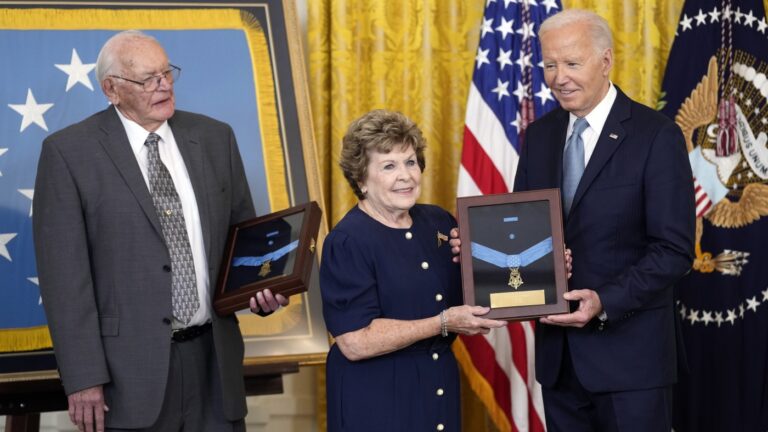President Biden presented the Medal of Honor to Theresa Chandler, the great-great-granddaughter of Private 2nd Class George D. Wilson, in the East Room of the White House in Washington on Wednesday. The medals posthumously honor two U.S. Army soldiers who were part of a daring Union Army contingent that robbed a Confederate train during the Civil War. U.S. Army Privates Philip G. Shadrach and George D. Wilson were captured by the Confederates and executed by hanging. At left is Gerald Taylor, the great-grandnephew of Private 2nd Class Philip G. Shadrach.
Susan Walsh/AP
hide legend
toggle caption
Susan Walsh/AP
WASHINGTON — President Biden on Wednesday awarded the Medal of Honor for conspicuous bravery to two Union soldiers who stole a locomotive deep in Confederate territory during the Civil War and drove it north 87 miles while destroying railroad tracks and telegraph lines.
American soldiers Philip G. Shadrach and George D. Wilson were captured by the Confederates and executed by hanging. Biden recognized their courage 162 years later by awarding them the nation’s highest military decoration, calling the operation they participated in “one of the most dangerous missions of the entire Civil War.”
“Every soldier who participated in that mission received the Medal of Honor, except for two. Two soldiers died because of that operation and never received that honor,” Biden said. “Today, we are righting that wrong.”
The posthumous recognition comes as the legacy of the Civil War, which killed more than 600,000 Union and Confederate servicemen between 1861 and 1865, continues to shape American politics in a contentious election year where issues of race, constitutional rights and presidential power are at the forefront.

Biden has said the January 6, 2021, riot at the U.S. Capitol by Donald Trump supporters was the greatest threat to democracy since the Civil War. Meanwhile, Trump, the presumptive Republican presidential nominee, recently made remarks at a rally in Pennsylvania about the Battle of Gettysburg and Confederate Gen. Robert E. Lee.
The president said Wednesday that Shadrach and Wilson “fought and died to preserve the union and the sacred values on which it was founded: liberty, justice, fairness, unity.”
“Phillip and George were willing to shed their blood to make these ideals a reality,” Biden said.
Theresa Chandler, Wilson’s great-great-granddaughter, told The Associated Press how the Union soldier had the rope around his neck on the gallows and spoke his last words.
She said Wilson basically said he was there to serve his country and that he had no ill will toward the people of the South, but that he hoped for the abolition of slavery and for the nation to be united again.
“When I read that, I got chills,” Chandler said. “We can feel that as a family, we’re enjoying our freedoms today, which is what he was trying to advance back then.”
Brian Taylor, a great-great-nephew of Shadrach, said it was an opportunity for his ancestor to be recognized as “a brave soldier who did what he thought was right.”

“I feel like he was a little bit adventurous, a little bit of a free spirit,” Taylor said.
Shadrach and Wilson are recognized for their participation in what became known as the Great Locomotive Hunt.
A Kentucky-born civilian spy and scout named James J. Andrews gathered a group of volunteers, including Shadrach and Wilson, to deface railroad and telegraph lines used by the Confederates in Chattanooga, Tennessee.
On April 12, 1862, 22 men from what would later be called the Andrews’ Raiders gathered in Marietta, Georgia, and hijacked a train called The General. The group tore up the tracks and cut the telegraph wires as they drove the train north.
Confederate troops pursued them, first on foot, then by train. They eventually caught up with the group. Andrews and seven others were executed, while the rest escaped or remained prisoners of war.
The first Medal of Honor ever awarded was to Private Jacob Parrott, who participated in the locomotive hijacking and was beaten while imprisoned by the Confederacy.
The government later awarded the medal to 18 other participants in the raid, but Shadrach and Wilson were excluded. They were later authorized to receive the medal under the Fiscal Year 2008 National Defense Authorization Act.

Shadrach, born September 15, 1840, in Pennsylvania, was 21 when he volunteered for the mission. Orphaned at a young age, he left home in 1861 to enlist in an Ohio infantry regiment after the Civil War began.
Wilson was born in Belmont County, Ohio, in 1830. He worked as a shoemaker before the war and enlisted in an Ohio-based volunteer infantry in 1861.
The Walt Disney Corp. made a film about the hijacking in 1956 called The Great Locomotive Chasestarring Fess Parker and Jeffrey Hunter. The 1926 silent film “The General,” starring Buster Keaton, was also based on this historical event.


